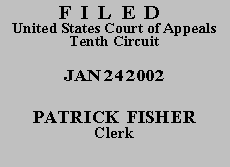

| KENNETH HENDRIX,
Plaintiff-Appellant, v. EMPLOYER'S REINSURANCE CORPORATION, Defendant-Appellee. |
|
Plaintiff-appellant Kenneth Hendrix brought this racial discrimination complaint against defendant-appellee Employer's Reinsurance Corporation (ERC) pursuant to Title VII of the Civil Rights Act of 1964, 42 U.S.C. §§ 2000e to 2000e-17. He now appeals from the district court's orders denying his motion for summary judgment and granting summary judgment in favor of ERC. We affirm.
On October 7, 1997, Hendrix, a black male, filed an EEOC complaint with the Kansas Human Rights Commission (KHRC), charging that ERC had discriminated against him on the basis of his age and race by terminating his employment.(1) The EEOC determined that there was reasonable cause to believe that racial discrimination had occurred; however, it was unable to reach a settlement with ERC. On April 14, 1999, KHRC issued a right to sue letter to Hendrix.
Hendrix thereafter filed a pro se complaint charging age and race discrimination. He later filed a one-paragraph motion for summary judgment on his race discrimination claim, relying on the EEOC's determination in his favor and ERC's alleged failure to provide requested discovery. The motion did not contain a statement of undisputed facts and was not accompanied by a memorandum in support or any affidavits or other materials designed to show Hendrix's entitlement to summary judgment. The district court denied the motion for summary judgment. Hendrix moved for rehearing, which the district court also denied.
The district court thereafter appointed counsel for Hendrix. Counsel filed an amended complaint, dropping the allegation of age discrimination. The amended complaint alleged that ERC had discriminated against Hendrix by failing to hire him for certain permanent accounting positions, and by hiring white employees to fill those positions instead. ERC filed its motion for summary judgment, which the district court granted.
We review the district court's orders granting and denying summary judgment de novo, applying the same standard as the district court. VBF, Inc. v. Chubb Group of Ins. Cos., 263 F.3d 1226, 1230 (10th Cir. 2001). Summary judgment is proper if the moving party shows "there is no genuine issue as to any material fact and that the moving party is entitled to a judgment as a matter of law." Fed. R. Civ. P. 56(c). "When applying this standard, we view the evidence and draw reasonable inferences therefrom in the light most favorable to the nonmoving party." Scull v. New Mexico, 236 F.3d 588, 595 (10th Cir. 2000) (quotation omitted).
In his first issue, Hendrix charges that the district court denied his motion for summary judgment because he was unrepresented by counsel. Our de novo review of the record demonstrates that the district court properly denied the motion because it did not comply with local rules; because ERC had responded appropriately to Hendrix's requested discovery; and because ERC demonstrated that genuine issues of material fact remained. Pro se litigants must follow the rules of procedure, including local rules. Green v. Dorrell, 969 F.2d 915, 917 (10th Cir. 1992). Hendrix's argument lacks merit.
Hendrix next contends that the district court should have considered ERC's failure to hire him for positions that were not specifically mentioned in the EEOC charge. The charge alleged discriminatory acts during the time period from August 8 through August 29, 1997. In response to ERC's motion for summary judgment, Hendrix presented argument concerning an additional job with ERC for which he was not selected in April 1997. The district court rejected this argument, finding that Hendrix had failed to exhaust his administrative remedies concerning ERC's failure to hire him for this position.
"A plaintiff must exhaust his administrative remedies before bringing suit under Title VII." Aramburu v. Boeing Co., 112 F.3d 1398, 1409 (10th Cir. 1997). Even assuming that the April 1997 position was "reasonably related" to those identified in the EEOC charge, see id., ERC was still entitled to summary judgment concerning its failure to hire Hendrix. As will be seen, Hendrix presented no evidence to show that ERC's stated, nondiscriminatory reasons for failing to hire him were pretextual. This applies as much to the April 1997 position as it does to the position for which Hendrix applied in August 1997.
In an effort to show pretext, Hendrix next points to an initial, favorable work evaluation he received from Kyung Sook Lee, who stated he was doing "excellent" work. R., doc. 66, Hendrix depo. at 16. Hendrix implies that this evaluation shows that the employer's stated reason for its failure to hire him, poor work performance, was pretextual. ERC presented unrebutted evidence showing that this favorable evaluation was made during Hendrix's initial two-week training period, and that his performance thereafter deteriorated to the point that Ms. Lee felt she had to check Hendrix's work more than was usual with other temporary workers. There was also unrebutted evidence that Hendrix made many mistakes in his work, causing ERC employees to have to do it over for him, and that he did not ask for additional work when he had finished an assignment. In sum, Hendrix failed to show that ERC's stated reasons for not hiring him for a permanent position were pretextual.
The judgment of the United States District Court for the District of Kansas is AFFIRMED.
Entered for the Court
Circuit Judge
*. This order and judgment is not binding precedent, except under the doctrines of law of the case, res judicata, and collateral estoppel. The court generally disfavors the citation of orders and judgments; nevertheless, an order and judgment may be cited under the terms and conditions of 10th Cir. R. 36.3.
1. The evidence shows that Hendrix was never an employee of ERC; instead, he worked as a temp at ERC for Robert Half Accountemps. As will be seen, once Hendrix obtained counsel, the claim was correctly restated as a failure to hire Hendrix for a permanent position.